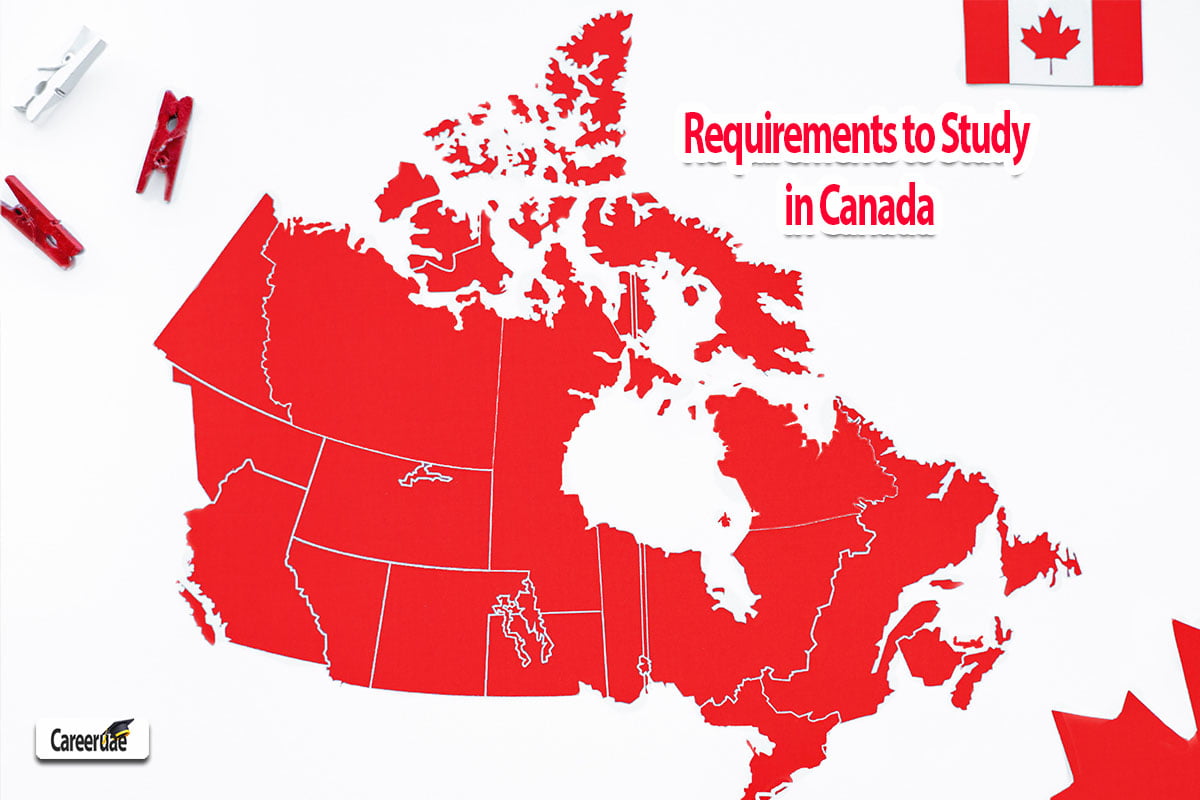To study in Canada as an international student, you need to fulfill certain requirements such as obtaining a study permit and demonstrating language proficiency. Furthermore, you may also need to provide proof of financial resources and meet specific admission criteria set by the chosen Canadian institution.
Studying in Canada as an international student offers a multitude of opportunities for academic and personal growth. Known for its world-class education system, multicultural environment, and diverse range of programs, Canada attracts students from all around the globe. However, before embarking on this educational journey, it is essential to understand the requirements that international students must meet.
This ensures a smooth transition and a successful academic experience. From securing a study permit to demonstrating language proficiency, this article will outline the mandatory prerequisites to study in Canada. Additionally, we will discuss the importance of financial resources and meeting admissions criteria set by Canadian institutions. By adhering to these requirements, international students can pave the way toward a rewarding educational experience in Canada.
Why Canada Is A Top Choice For International Students
Canada’s appeal for international students is due to its top-notch education system and ample opportunities for growth. With straightforward requirements to study in Canada, such as obtaining a study permit and meeting language proficiency standards, students can easily pursue their educational aspirations in this diverse and welcoming country.
Canada has become a preferred destination for international students seeking quality education and numerous opportunities. Here are some key reasons why Canada stands out as a top choice:
Quality Education And Academic Standards:
- Canadian universities and colleges are globally recognized for their high academic standards and quality of education.
- The country boasts a strong reputation for research and innovation, offering cutting-edge programs in various disciplines.
- Professors and instructors are renowned for their expertise and dedication to providing a supportive learning environment.
- Access to state-of-the-art facilities and resources ensures that students receive a comprehensive education.
Diverse And Inclusive Society:
- Canada is known for being one of the most diverse and inclusive countries in the world, welcoming people from various cultural backgrounds.
- International students experience a friendly and multicultural environment that promotes cultural exchange and understanding.
- With over 200 ethnic origins reported across the country, students have the opportunity to immerse themselves in different cultures and perspectives.
- This diversity contributes to a vibrant social atmosphere, enriched by events and festivals celebrating various traditions.

Post-Graduation Work Opportunities:
- Upon completing their studies, international students have the opportunity to gain valuable work experience through post-graduation work permits (pgwp).
- The pgwp allows students to work in Canada for up to three years, depending on the length of their study program.
- This provides graduates with an opportunity to apply their newly acquired skills and knowledge in a professional setting while further integrating into Canadian society.
- Canadian work experience can be a vital asset for those who aspire to transition into the Canadian labor market permanently.
Canada’s appeal to international students lies in its commitment to providing a high-quality education, fostering a diverse and inclusive society, and offering post-graduation work opportunities. By choosing Canada, students can acquire excellent academic qualifications, experience cultural diversity, and set the foundation for a successful career.
Academic Requirements For International Students
International students who wish to study in Canada must meet specific academic requirements. These requirements ensure that students are prepared to excel in their chosen programs and contribute effectively to Canadian society.
Studying in Canada as an international student offers numerous opportunities for educational and personal growth. To ensure that you’re eligible for admission, there are certain academic requirements you need to meet. These requirements guarantee that you have a strong foundation and the ability to thrive in Canadian educational institutions.
Here are the key academic requirements for international students:
- High school diploma or equivalent: To apply for college or university in Canada, you need to have completed your high school education or obtained an equivalent qualification. A high school diploma or its equivalent demonstrates your basic level of education and prepares you for higher education.
- Language proficiency (English or French): International students must demonstrate proficiency in either English or French, the official language of instruction in Canada. This requirement ensures that you can comprehend lectures, participate in discussions, and complete written assignments effectively. Language proficiency can be demonstrated through standardized language proficiency tests.
- Standardized tests (SAT, ACT, IELTS, etc. ): Many Canadian institutions require international students to provide scores from standardized tests to assess their academic aptitude. These tests include the SAT (Scholastic Assessment Test), ACT (American College Testing), IELTS (International English Language Testing System), and others. These tests evaluate your knowledge and skills in subjects such as English, mathematics, and science.
- Minimum grade requirements: Canadian institutions may have minimum grade requirements for specific programs or courses. These minimum grade requirements ensure that you have a certain level of academic competence and can handle the coursework effectively. Meeting the minimum grade requirements is crucial for gaining admission to your desired program.
Understanding and meeting the academic requirements for international students is essential for pursuing higher education in Canada. Ensure that you have a high school diploma or equivalent qualification, demonstrate language proficiency in english or french, provide scores from standardized tests, and meet the minimum grade requirements for your chosen program.
By meeting these requirements, you’ll be on your way to a successful educational journey in Canada.
Financial Requirements For International Students
International students planning to study in Canada must fulfill the financial requirements set by the Canadian government. These include demonstrating sufficient funds to cover tuition fees, living expenses, and transportation costs.
Studying in Canada as an international student comes with certain financial obligations. From tuition fees to living expenses, it’s essential to plan ahead and understand the financial requirements involved. In this section, we will explore the various financial aspects that you need to consider when studying in Canada.
Tuition Fees And Living Expenses
- Tuition fees: Canadian educational institutions offer a wide range of programs, each with its own tuition fees. The costs may vary depending on the course level (undergraduate or graduate), the duration of the program, and the institution itself. On average, undergraduate programs can cost between $20,000 to $35,000 cad per year, while graduate programs may range from $15,000 to $55,000 cad per year. Research thoroughly to understand the specific tuition fees for your chosen field of study and institution.
- Living expenses: In addition to tuition fees, international students need to consider their day-to-day living expenses. These expenses include accommodation, food, transportation, health insurance, and miscellaneous costs. The amount required for living expenses will depend on your lifestyle and the city you choose to live in. On average, students can expect to spend around $15,000 to $20,000 cad per year on living expenses.
Scholarships, Grants, And Bursaries
To alleviate some financial burden, international students can explore scholarship opportunities, grants, and bursaries. These financial aids are offered by Canadian institutions, government bodies, and other organizations to support students in pursuing their studies. Some options to consider include:
- Institutional scholarships: Many Canadian universities and colleges have scholarships specifically for international students. These scholarships are often merit-based and can help cover a significant portion of your tuition fees.
- Government scholarships: The Canadian government offers various scholarships for international students, such as the vanier Canada graduate scholarships and the Canadian commonwealth scholarships program.
- External scholarships: There are also external organizations that provide scholarships for international students studying in Canada. These include organizations like the world bank, fulbright program, and various foundations.
- Bursaries and grants: Apart from scholarships, you may also be eligible for bursaries and grants based on financial need or specific criteria. These are financial aids that do not need to be repaid.
Proof Of Funds Document
When applying for a study permit in Canada, you will typically be required to provide a proof of funds document. This document demonstrates that you have enough money to cover your tuition fees and living expenses throughout your study period.
The specific amount you need to show will depend on the location of your institution and the duration of your program.
- The proof of funds document should show that you have sufficient funds to cover your first year’s tuition fees, as well as the funds to support yourself for each subsequent year of study.
- The accepted proof of funds can include bank statements, scholarship award letters, or a letter from your financial sponsor. It is important to ensure that the document is authentic, up-to-date, and meets the requirements specified by the Canadian government.
By understanding the financial requirements for international students in Canada, you can plan accordingly and make financial arrangements to pursue your education in this diverse and welcoming country.
Visa And Immigration Requirements
To study in Canada as an international student, it is important to meet the visa and immigration requirements. These requirements include obtaining a study permit and meeting financial and language proficiency criteria. It is essential to carefully adhere to these requirements to ensure a smooth study experience in Canada.
Canada is a top study destination for international students due to its world-class education system and multicultural environment. However, before embarking on your Canadian study journey, it is essential to be familiar with the visa and immigration requirements. This section will guide you through the study permit application process, the necessary documents, medical exams and insurance, as well as work permit regulations.
Study Permit Application Process
To study in Canada as an international student, you will typically need to obtain a study permit. Here’s an overview of the study permit application process:
- Online application: Begin by completing the online application form available on the official website of immigration, refugees, and citizenship Canada (ircc).
- Proof of acceptance: You will need to provide a letter of acceptance from a designated learning institution (dli) in Canada. Ensure that the institution you choose is on the list of dlis approved by the Canadian government.
- Financial proof: Demonstrate that you have enough funds to cover your tuition fees, living expenses, and return transportation. This may include bank statements, scholarship letters, or a letter of financial support.
- Language proficiency: Depending on your program of study, you may need to provide evidence of your proficiency in english or french. Accepted language tests include the IELTS, TOEFL, or celpip for english, and the tef for french.
- Biometrics and processing times: In certain cases, you may be required to provide biometric information (fingerprints and photo). Keep in mind that processing times can vary, so it is advisable to apply for your study permit well in advance.
Documents Needed For Study Permit
When applying for a study permit in Canada, you will need to gather several important documents:
- Passport: Ensure your passport is valid for the duration of your study period in Canada.
- Letter of acceptance: Obtain an official letter of acceptance from a Canadian dli.
- Financial documents: Provide proof of funds to cover your tuition fees, living expenses, and return transportation.
- Academic transcripts and credentials: Include copies of your high school, college, or university transcripts and diplomas.
- Language proficiency test results: If required, submit your language proficiency test results.
- Photos: Provide recent passport-sized photographs as per ircc’s specifications.
Medical Exams And Insurance
International students studying in Canada are generally required to undergo a medical examination. Here are the key points to remember:
- Medical examination: You may need to undergo a medical examination if you plan to study in Canada for more than six months. Find a panel physician approved by ircc in your home country or the country where you currently reside.
- Health insurance: It is important to have health insurance coverage during your stay in Canada. Some provinces require international students to have provincial health care coverage, while others may offer private insurance options.
Work Permit Regulations
While studying in Canada, international students may have the opportunity to work on or off-campus. Here are some important work permit regulations to keep in mind:
- Off-campus work permit: Once you’ve enrolled in a full-time program at a dli, you may be eligible to work off-campus for up to 20 hours per week during regular academic sessions, and full-time during scheduled breaks.
- Co-op and internships: Many Canadian institutions offer cooperative education programs or internships, allowing students to gain valuable work experience while studying. These work experiences are typically facilitated through a co-op work permit.
- Post-graduation work permit: After completing your studies, you may be eligible to apply for a post-graduation work permit (pgwp). This permit allows you to work in Canada for up to three years, depending on the length of your study program.
Understanding the visa and immigration requirements is crucial for international students planning to study in Canada. By familiarizing yourself with the study permit application process, necessary documents, medical exams and insurance, as well as work permit regulations, you can ensure a smooth transition and an enjoyable academic experience in Canada.
Choosing The Right Canadian University Or College
Choosing the right Canadian university or college can be a complex process for international students. Discovering the specific requirements needed to study in Canada is essential to ensure a smooth application process and successful educational journey.
Studying in Canada as an international student provides numerous opportunities for personal and academic growth. Choosing the right Canadian university or college is a crucial step in ensuring a successful educational journey. Consider factors such as available programs, admission requirements, accreditation and rankings, as well as campus facilities and resources to make an informed decision.
Researching Available Programs:
- Start by researching the programs offered by various Canadian universities and colleges. This will help you determine which institutions specialize in your field of study.
- Look for programs that align with your career goals and interests.
- Consider the curriculum, course offerings, and faculty expertise within each program to ensure they meet your educational needs.
Admission Requirements And Prerequisites:
- Familiarize yourself with the admission requirements of different universities and colleges in Canada.
- Check the specific prerequisites for the program you wish to pursue, such as minimum grade point average (gpa), standardized test scores, and language proficiency requirements.
- Some institutions may require additional documents, such as letters of recommendation or a statement of purpose. Make sure you understand and fulfill all the requirements before applying.
Accreditation And Rankings:
- Accreditation ensures that an institution meets certain quality standards. Look for universities and colleges that are accredited by recognized accreditation bodies in Canada.
- Consider checking the rankings of Canadian universities and colleges to get an idea of their academic reputation and overall quality. However, keep in mind that rankings are just one aspect to consider and should not be the sole factor in your decision-making process.
Campus Facilities And Resources:
- Evaluate the campus facilities and resources offered by different institutions. This includes libraries, laboratories, research centers, sports facilities, and student support services.
- Check if the institution provides opportunities for internships, co-op programs, or study abroad experiences relevant to your field of study.
- Consider the location of the campus and the surrounding community, as it can greatly impact your overall experience as an international student.
Choosing the right Canadian university or college is a significant decision that can shape your academic and professional future. Take the time to thoroughly research available programs, understand the admission requirements, consider accreditation and rankings, and evaluate campus facilities and resources.
By doing so, you’ll be well-equipped to make an informed choice and embark on a rewarding educational journey in Canada.
Applying To Canadian Universities And Colleges
Studying in Canada as an international student requires meeting specific requirements set by Canadian universities and colleges. These prerequisites ensure that students are well-prepared for their chosen programs and can make the most of their educational experience in Canada.
Studying in Canada provides international students with a wealth of opportunities for academic and personal growth. To pursue your education in Canada, you need to understand the application process for universities and colleges. Here are the key requirements you should be aware of:
Application Deadlines And Procedures:
- Research and note down the application deadlines for your chosen universities or colleges in Canada.
- Start your application process well in advance to allow time for gathering required documents.
- Check the specific application procedures for each institution, as they may vary.
Application Form And Required Documents:
- Begin by filling out the application form provided by the university or college. Submit it online or through the institution’s designated method.
- Ensure that you provide accurate personal information, educational history, and contact details.
- Prepare the necessary documents, including academic transcripts, diplomas, language proficiency test scores (such as IELTS or TOEFL), and passport copies.
- Check if you need to provide translated versions of any documents that are not in english or french.
Essay/Personal Statement:
- Craft a compelling essay or personal statement that showcases your motivations, experiences, and future goals.
- Highlight your academic achievements, extracurricular activities, community involvement, and any obstacles you have overcome.
- Use this opportunity to explain why you have chosen to study in Canada and how it aligns with your career aspirations.
- Make sure your essay is well-structured, concise, and free of grammatical errors.
Recommendation Letters:
- Request recommendation letters from teachers, professors, or employers who can speak to your abilities, character, and potential.
- Notify your references well in advance to give them enough time to write detailed and positive letters.
- Provide them with an overview of your academic and personal achievements to guide their recommendations.
- Emphasize the importance of submitting the letters by the specified deadline.
By understanding and fulfilling these requirements, you will enhance your chances of successfully applying to Canadian universities and colleges. Take the time to carefully review the application procedures and ensure that all necessary documents are submitted on time. Good luck with your application process!
Housing And Accommodation Options For International Students
Studying in Canada as an international student? Discover the diverse housing and accommodation options available to meet your requirements. Find the perfect place to live during your Canadian education journey.
On-Campus Residence:
- Many universities and colleges in Canada offer on-campus residence options for international students.
- Living on campus provides a convenient and immersive experience, allowing students to fully integrate into the college community.
- Benefits of on-campus residence include proximity to classes, access to campus facilities, and opportunities to make friends with fellow students.
- On-campus housing typically consists of dormitory-style rooms, with shared facilities such as kitchens and bathrooms.
- Residence halls are equipped with amenities like study areas, common rooms, and laundry facilities.
- Housing fees vary depending on the institution and the type of room chosen.
Off-Campus Housing:
- For international students who prefer more independence or seek different accommodation options, off-campus housing is available.
- Many students choose to rent apartments or shared houses in nearby neighborhoods.
- Renting off campus gives students the opportunity to experience life outside of the campus while still being close to the university or college.
- Off-campus housing can provide more privacy and flexibility compared to on-campus residences.
- Renting off campus may require additional responsibilities, such as arranging utilities and managing personal finances.
- It is important to consider factors such as location, safety, and cost when searching for off-campus housing.
Homestay Programs:
- Homestay programs are an excellent option for international students who want to live with a local family during their studies in Canada.
- Through homestays, students can experience Canadian culture firsthand and improve their language skills.
- In a homestay, students become part of a Canadian family, typically with their own room and shared common spaces.
- The host family provides meals and offers support and guidance.
- Homestay programs often include additional services such as airport pickup and assistance with settling into the new environment.
- Living with a host family can offer a warm and supportive environment for international students.

Renting An Apartment:
- Renting an apartment is a popular housing choice for international students in Canada.
- Apartments offer more independence and allow students to personalize their living space.
- When renting an apartment, students need to consider factors such as the location, rent prices, and lease terms.
- It is important to budget for additional expenses such as utilities, internet, and furniture.
- Many universities and colleges have resources to assist students in finding suitable apartments, either through online platforms or support services.
- It is advisable to research and view multiple rental options to find the best fit before signing a lease agreement.
Remember, understanding the housing and accommodation options available to international students in Canada is crucial when planning your study abroad experience. Whether you choose on-campus residence, off-campus housing, a homestay program, or renting an apartment, each option provides unique benefits and considerations.
Take the time to explore and assess which option aligns with your preferences and needs.
Health Insurance For International Students
Health insurance is a crucial requirement for international students studying in Canada. It ensures they have access to medical services, covering their healthcare needs and offering peace of mind during their time abroad.
Studying abroad in Canada as an international student is an exciting opportunity to embark on a new educational journey. As you plan your transition to studying in Canada, one essential aspect to consider is health insurance coverage. Canada offers a range of health insurance options for international students, ensuring that you have access to medical services and peace of mind during your time in the country.
Coverage Options
When it comes to health insurance coverage for international students in Canada, there are two main options to consider:
- Provincial healthcare plans: Most provinces in Canada offer provincial healthcare coverage to international students who meet certain criteria. This coverage includes essential medical services, such as doctor’s visits, hospital stays, and diagnostic tests. However, it’s important to note that this coverage may not include prescription medications, dental care, or vision care.
- Private health insurance plans: Many international students opt to purchase private health insurance plans to supplement their provincial coverage or if they are not eligible for provincial plans. These plans typically provide additional coverage for services not covered by the provincial plans, including prescription medications, dental care, and vision care. Private plans often offer flexibility, allowing you to choose the level of coverage that suits your needs.
Eligibility And Application Process
To be eligible for provincial healthcare plans in Canada, international students must meet specific requirements, which vary by province. Generally, you need to be enrolled in a full-time program of study that exceeds a certain duration, such as six months or more.
Additionally, you may be required to show proof of enrollment at a recognized Canadian educational institution and maintain a valid study permit throughout your stay.
The application process for provincial healthcare coverage typically involves filling out an application form and providing supporting documents, such as proof of enrollment and study permit. It’s crucial to familiarize yourself with the requirements of the specific province where you will be studying and start the application process well in advance to ensure you have coverage upon arrival.
For private health insurance plans, eligibility and application processes vary depending on the provider. You will need to research different insurance companies and compare their offerings to find a plan that suits your needs. The application process may involve submitting an online form, providing personal and medical information, and paying the required premiums.
Cost And Premiums
The cost of health insurance for international students in Canada depends on various factors, including your age, the province you will be studying in, the length of your program, and the level of coverage you choose. It’s essential to consider your budget and the coverage options available to make an informed decision.
Provincial healthcare plans generally require international students to pay a premium, which can range from a few hundred dollars to several hundred dollars per year. Private health insurance plans’ premiums vary widely depending on the provider, coverage level, and individual factors.
It’s advisable to research and compare different options to find a plan that meets your needs without exceeding your budget.
Access To Medical Services
Once you have health insurance coverage in Canada, you will have access to a wide range of medical services. With provincial healthcare plans, you can visit doctors, specialists, and hospitals covered under the plan. In emergencies, you can also seek medical assistance at the nearest hospital.
Private health insurance plans often have a network of healthcare providers, such as doctors and dentists, where you can receive services at reduced rates. These plans may also offer reimbursement for services obtained outside the provider network, allowing you the flexibility to choose your preferred healthcare professionals.
Remember that it’s crucial to familiarize yourself with the specifics of your health insurance coverage, including any deductible amounts, co-pays, and limitations, to ensure a smooth experience when seeking medical services in Canada.
As an international student in Canada, having health insurance is vital for your wellbeing and peace of mind. Whether you opt for provincial coverage or choose a private plan, ensure that you have the necessary coverage to access medical services and stay protected throughout your educational journey in Canada.
Working Opportunities For International Students
Studying in Canada offers abundant working opportunities for international students. These opportunities come with certain requirements that students need to fulfill, allowing them to gain valuable work experience while pursuing their education.
As an international student studying in Canada, you have several working opportunities that can help enhance your academic experience, build your skills, and earn some extra income. The Canadian government offers various options for international students to work both on and off campus.
Let’s explore these opportunities in more detail:
On-Campus Employment:
- Working on campus can be a convenient option for international students as it allows you to balance your work and study schedule.
- You can work up to 20 hours per week during regular academic sessions, and full-time during scheduled breaks such as summer or winter holidays.
- On-campus employment provides opportunities to work in different departments of your university, including libraries, computer labs, student services, or research projects.
- It allows you to gain valuable work experience, build connections with faculty and staff, and get involved in the campus community.
Co-Op Programs And Internships:
- Many Canadian universities and colleges offer cooperative education (co-op) programs or internships for international students.
- Co-op programs provide practical work experience related to your field of study, allowing you to apply classroom knowledge in real-world situations.
- Internships also offer similar opportunities and can be arranged through your educational institution or external organizations.
- Co-op programs and internships usually require you to work full-time for a predetermined period, providing you with hands-on experience and valuable skills for future employment.
Work Off-Campus:
- International students studying full-time at designated learning institutions (dlis) in Canada can also work off-campus.
- You can work up to 20 hours per week during regular academic sessions and full-time during scheduled breaks.
- Off-campus work allows you to gain experience outside of the campus environment, broaden your network, and explore different industries.
- It’s important to note that you must have a valid study permit and be enrolled in a participating institution to be eligible for off-campus work.
Post-Graduation Work Permits:
- After completing your studies, you may be eligible for a post-graduation work permit (pgwp), which allows you to work in Canada for up to three years.
- The pgwp enables you to gain valuable Canadian work experience, which can contribute to your future career goals.
- To be eligible for a pgwp, you must have completed a full-time program at a designated learning institution and meet specific requirements.
- This permit offers a great opportunity to transition to the Canadian workforce and potentially apply for permanent residency.
These working opportunities for international students in Canada provide a chance to gain practical experience, earn income, and enhance your career prospects. Whether you choose on-campus employment, co-op programs, work off-campus, or post-graduation work permits, each option offers unique benefits that can contribute to your academic and professional growth.
Take advantage of these opportunities and make the most of your study experience in Canada.
Cultural And Social Integration For International Students
Cultural and social integration play a crucial role in the requirements for international students studying in Canada. By embracing and actively participating in Canadian customs and society, students can enhance their overall learning experience and broaden their horizons.
Studying in Canada as an international student presents a fantastic opportunity to immerse oneself in a new culture while furthering your education. Cultural and social integration plays a crucial role in making the most of your experience abroad. Here are some key areas to focus on:
Orientation Programs
- Orientation programs provide essential information and guidance to help international students adjust to their new academic environment
- These programs typically cover topics such as course selection, campus facilities, academic policies, and support services
- Participating in orientation programs allows students to meet fellow international students and build connections right from the start
- Students gain valuable insights into Canadian campus culture and are introduced to various resources to ease their transition
International Student Associations/Clubs
- Joining international student associations or clubs helps foster connections with people who share similar experiences and backgrounds
- These associations often organize a range of social and cultural events throughout the academic year
- By engaging in these activities, international students can expand their network, strengthen their sense of belonging, and learn more about different cultures
- It is an excellent opportunity to explore diverse perspectives and make lifelong friendships
Canadian Customs And Etiquette
- Familiarizing yourself with Canadian customs and etiquette will enable you to navigate social situations with confidence
- Canadians tend to be friendly and polite, so showing respect, being punctual, and using common courtesies are important
- Understanding cultural differences, such as personal space and appropriate greetings, will help avoid misunderstandings
- Canadian traditions and celebrations, like Thanksgiving or Canada Day, provide opportunities to engage with locals and showcase your multiculturalism
Building A Support Network
- Building a support network is crucial to have a fulfilling experience as an international student
- Reach out to your peers, professors, academic advisors, and international student services for guidance and support
- Attend workshops and events focused on academic success, mental health, and cultural adjustment
- Seek out mentorship programs or peer support groups that can provide a sense of camaraderie and assistance when facing challenges
Remember, cultural and social integration takes time and effort, but investing in these areas will enhance not only your academic experience but also your overall journey in Canada. Embrace the opportunity to learn and grow, while forming connections that will last a lifetime.
Frequently Asked Questions Of Requirements To Study In Canada For International Students
What Are The Basic Requirements To Study In Canada?
To study in Canada, international students need a valid study permit, a letter of acceptance from a designated learning institution, proof of funds for tuition and living expenses, and a clean criminal record.
Can International Students Work While Studying In Canada?
Yes, international students with a study permit can work part-time on campus and off-campus during their studies in Canada.
Is There Any Age Limit To Study In Canada As An International Student?
No, there is no age limit to study in Canada as an international student. However, the admission requirements and procedures may vary depending on the age of the applicant.
How Much Does It Cost To Study In Canada For International Students?
The cost of studying in Canada for international students varies depending on the institution, program, and location. On average, tuition fees for international students range from cad $20,000 to $40,000 per year, excluding living expenses.
Can International Students Get Scholarships To Study In Canada?
Yes, there are several scholarships available for international students to study in Canada. These scholarships are offered by the Canadian government, Canadian institutions, and external organizations. Students can explore scholarship opportunities based on their academic achievements and eligibility criteria.
Conclusion
Studying in Canada as an international student presents a multitude of exciting opportunities. The country’s high-quality education system, diverse culture, and welcoming environment make it a top choice for students worldwide. To pursue your education in Canada, you must meet certain requirements, such as obtaining a study permit, demonstrating sufficient financial resources, and meeting language proficiency criteria.
It is crucial to thoroughly research and understand these requirements to avoid any complications during the application process. Additionally, it is recommended to seek guidance from educational consultants or advisors who can provide valuable insights and support throughout the journey.
Canada offers a wide range of programs and institutions catering to different interests and career goals, ensuring that every student can find a suitable academic path. By fulfilling the necessary requirements and making wise choices, international students can have a rewarding educational experience in Canada.





